The field of research the professorship is the Electromagnetic Compatibility (EMC). The EMC refers to the desired state that technical devices or components do not affect one another by means of electromagnetic effects. The following aspects are examined:
• noise immunity, that is immunity to external noise sources and
• the emission, that is the property itself to act as a source of interference.
These requirements are relevant today in almost all technical fields of application. Currently, research is being conducted at the Chair at a range of questions on the topic of EMC . The focus is on the development of methods for the EMC-compliant design of electronic devices. Here, among others, numerical field calculation programs are used. The existing laboratory equipment includes, inter alia, an anechoic chamber, TEM cell, a variety of measurement receivers, power amplifiers, vector network analyzers, and computer hardware and software for the numerical field and network calculation.
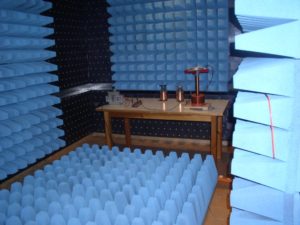
build up in the anechoic chamber
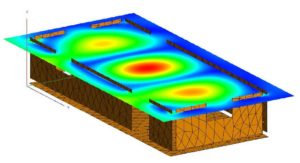
calculated field distribution in a spatial structure
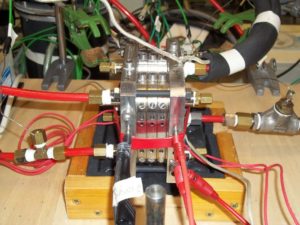
fuel cell
Field of Research
- Electromagnetic compatibility (EMC)
- Design methods for EMC-compliant products
- Use of numerical field calculation for EMC
Current research topics
- Disturbances in the power electronics of fuel cells
- Emissions in electric drive concepts
- EMC of power electronic circuits
- Immunity testing of ships
- Noise coupling in cables and harnesses
- Topological concepts in EMC analysis
- Investigation of the immunity of pacemakers
An overview of the current research, please visit: Recent Publications
Laboratory Equipment
- Anechoic chamber, small absorber chamber, air chamber, (G)TEM cells
- Vector Network Analyzers 9 kHz – 8 GHz
- Digital Oscilloscopes up to 80 GS/s
- Spectral and signal analyzers to 30 GHz
- RF signal generator to 6 GHz
- Main Harmonic Analysator
- different antennas 20 MHz – 18 GHz
- E- and H-field probes (near field, far field)
- RF current probe (up to 4 GHz)
- Power meter
- Precision LCR measuring bridge with offset current sources
- NF- power amplifier and the RF power amplifier
- Line Impedance Stabilisation Network (LISN), High Performance Power Supply
- General: high-frequency and electronic laboratory equipment
Computer technology
- General: PCnetwork with Linux and Windows servers
- Mathematical calculation / Programming: Maple, Matlab, Mathematica
- Network Analysis: LTSpice, SABER
- Numerical calculation of fields: EMSS FEKO, CST Microwave Studio
- Device Control Laboratory / data acquisition: LabView, Matlab
Dienstleistungsangebote
- Kooperationen mit Firmen und anderen externen Stellen im Rahmen von Forschungs- und Entwicklungsvorhaben im Bereich der Elektromagnetischen Verträglichkeit
- Entwicklungsbegleitende EMV-Untersuchungen
Ausschreibungen Bachelor- und Masterarbeiten
Forschungsschwerpunkt Elektromagnetische Verträglichkeit
Das Forschungsgebiet der Professur Grundlagen der Elektrotechnik (Prof. Dickmann) ist die Elektromagnetische Verträglichkeit (EMV). Die Elektromagnetische Verträglichkeit bezeichnet den erwünschten Zustand, dass technische Geräte einander nicht wechselseitig mittels ungewollter elektromagnetischer Effekte beeinflussen. Dabei wird zwischen der Störfestigkeit, d.h.der Immunität gegenüber äußeren Störquellen und der Störaussendung, also dem eigenen Beitrag als Störquelle, unterschieden. Bezüglich beider Aspekte müssen entsprechende Grenzwerte eingehalten werden.
Themenspektrum für Studien- u. Diplomarbeiten / Bachelor- u. Masterarbeiten
Nach Absprache sind eine Reihe unterschiedlichster Arbeiten möglich. Auch eigene Vorschläge können eingebracht werden. Grundsätzlich sind Arbeiten möglich in den Bereichen angewandte Messtechnik, Simulation, Entwicklung von Messtechnik ( z.B.Entwurf neuer Antennentypen, Programmierung grafischer Oberflächen und von Steuerungstechnik, Schaltungsentwurf), Messautomatisierung, Arbeiten zur Unterstützung der Lehre (Visualisierung von EMV-Aspekten, Entwicklung neuer EMV-Versuche, …) u.v.m.

Kontakt
• In den Ausschreibungen genannte Ansprechpartner
• Wissenschaftliche Mitarbeiter der Professur GET
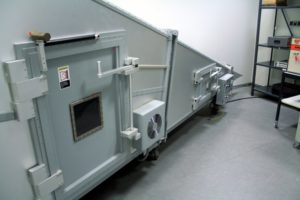
GTEM-Zelle
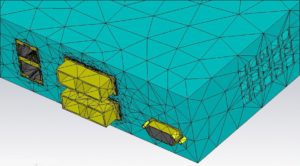
CAE-Modell eines Netzwerk-Switches
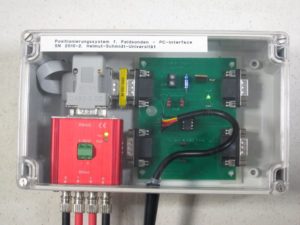
Dateninterface für automatisiertes EMV-Messsystem
Professorship ■ Team ■ Research ■ Lectures
Letzte Änderung: 13. February 2018
